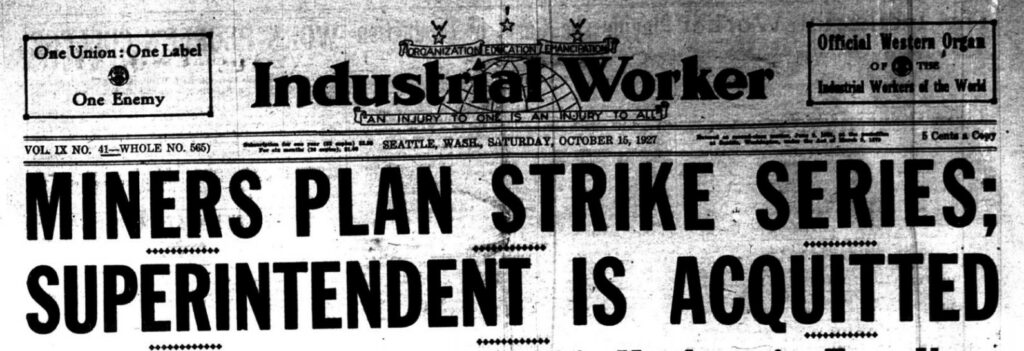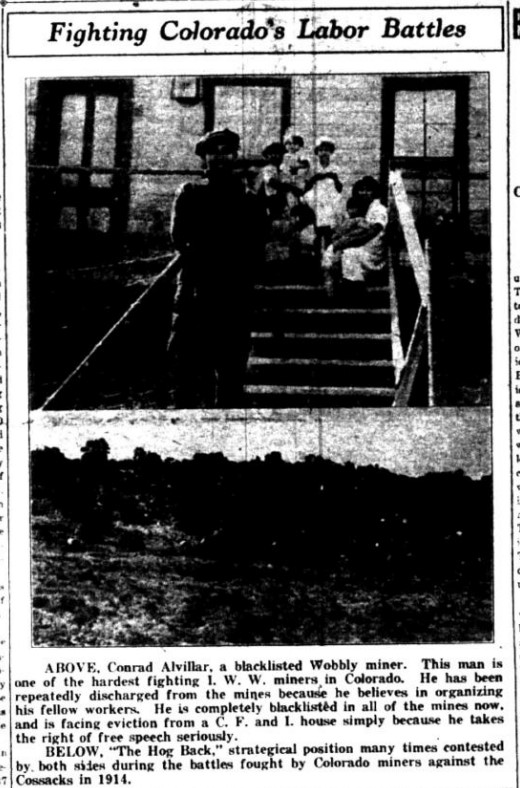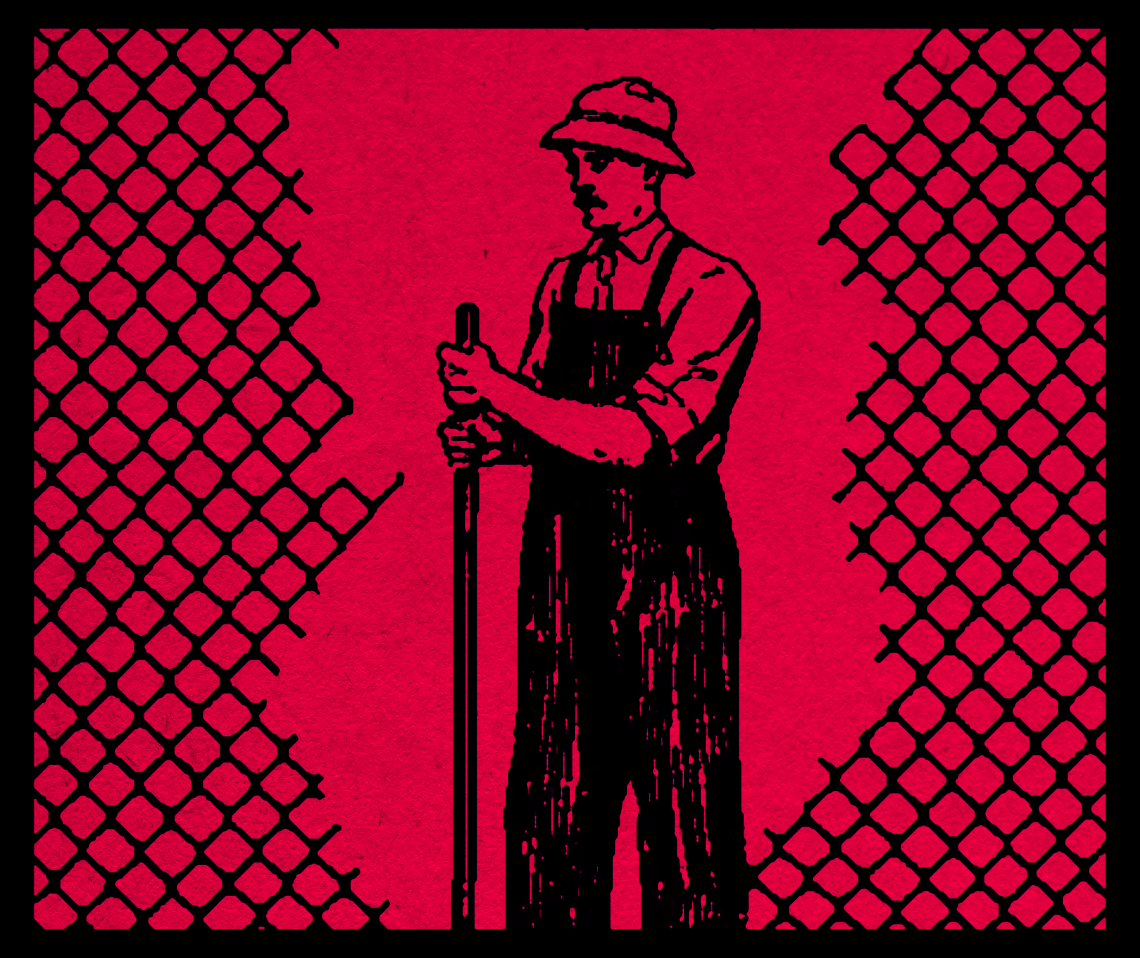This will be a multi-part series showcasing the Industrial Worker coverage of the IWW Colorado Miners Strike and subsequent Columbine Mine Massacre. This will be followed by original reporting on the strike and massacre.
This first clip and article come from the October 15th, 1927 issue of the Industrial Worker.

MINERS PLAN STRIKE SERIES; SUPERINTENDENT IS ACQUITTED

BELOW: “The Hog Back”, strategical position many times contested by both sides during the battles by Colorado miners against the cossacks in 1914.
What is needed is speedy relief, and we are going to get it through direct economic action by organized strikes. Our plans at the present is to answer by giving blow for blow, by strikes. When any member is discharged for union activity, we shall answer by a STRIKE IN ALL THE MINES OF THE COMPANY INVOLVED.
DISCRIMINATION TO BE MET WITH REPEATED STRIKES IN COLORADO AREA
Steel Workers of Pueblo Expected to Join State Wide General Walkout: Conference October 16 to Elect State Executive Board
By Kristen Svanum
PUEBLO, Colo. — On Sunday, September 25th, the Colorado Fuel and Iron Company announced a wage increase of 68 cents a day for daymen and an increase of 4 cents a ton for miners mining pick coal.
“The attitude of one miner, who declared today, “the extra money looks good to me” is believed to be the attitude of most Southern Colorado Coal Miners,” says the Rocky Mountain News on Tuesday, September 27th.
This seems on the surface reasonable enough, but it is far from the actual situation. For one thing the daymen constitute only a very small percentage of the working force as compared with the diggers. Another point of importance is that the increase to be the same for the diggers as for the daymen would necessitate that they dig 17 tons of coal a day, a manifest impossibility. Six or seven tons of coal a day being considered a very good day’s work for a miner loading pick coal. The miners loading machine coal have so far been left out in the cold.
To accept this small increase without further struggle is far from the mind of the Colorado coal miners and from the policies of the IWW in Colorado. Our policy in regards to this question has now been shaped in its general outline and will, except or unimportant changes as to detail, be as follows:
Conferences will be called in the Southern and Northern district, and in the Freemond County of the coal miners. On the same date we hope to have the GRU call a mass meeting of the Pueblo steel workers.
At these conferences district policies will be shaped and delegates elected to an All State Conference to take place in Pueblo on October 16. One of the orders of business of the All State Conference will be the election of a State Executive Board, with authority to call a state wide strike of miners and steel workers. We hope that this strike call will be inside the thirty day’s notice law, but it seems that the Industrial Commission has for its main business to make any strike call illegal.
This of course we can’t help. If the Industrial Commission wants to discredit itself further in the eyes of the workers of Colorado, who are we to stop them from doing so?
Besides the big issue of wages and a general scale of working conditions which only can be settled by radical change there are several problems confronting us in Colorado that will require constant and patient attention and a continuous grind of hard work.
The first problem is in regards to undue discrimination by the management and discharge of miners for union activity. There is a law against that, but that law can be circumvented with too much ease and we cannot rely on officials of the state, whether legislative, judicial, or executive. The only security we shall have is when we have a union functioning on the job that can attend to all grievances.
As a test we instituted proceedings against the superintendent of the Walsen Mine. It was a forgone conclusion that he would be acquitted but it was quite an eye-opener to the miners to see that there was no relief in court. Juan Noriega, the member in question was told that he was not discharged for being an IWW BUT FOR IWW activity. Quite a distinction.
The district attorney was prosecuting the case vigorously, was as far as could be expected and even more. He stated the case clearly and has even now taken a test case into district court. It is up to the district court now either to give us a square deal or to admit our contention that courts are machines of class justice. It is the court that is on trial more than we are, as we have other avenues of relief.
In the installation of checkweighmen we meet with the same disregard of law from the companies side. Our checkweighmen have always been elected by an overwhelming majority. Nevertheless they have been denied admittance to the tipple by mine superintendents. The Mine Inspector has been very diligent in his duties, but has had a hard task. At the Toltec Mine he started injunction proceedings that still are pending. He was a member of the UMW of A and is still I believe a good union man at heart, and sick of the companies disregard of mining laws.
But while injunction proceedings are pending the miners are getting browbeaten, while the managements are jerrymandering fake elections. Same trouble as in the blacklisting cases. What is needed is speedy relief, and we are going to get it through direct economic action by organized strikes.
Our plans at the present is to answer by giving blow for blow, by strikes. When any member is discharged for union activity, we shall answer by a STRIKE IN ALL THE MINES OF THE COMPANY INVOLVED. The same procedure will be followed in case of any undue interference with the installation of checkweighmen and pit committee, or with their performance of their duties.
The fight will be on and it seems possible that our main line of attack will be against the CFI. This company has long enough pushed the small companies in front and had them do its fighting. We are going to hit straight home this time.
Sentiment throughout the field is fine, but it is a hard battle. The membership of the IWW should realize that this is the toughest battle that we have engaged in for years, and that assistance in needed. Active members who know about coal mining should come to this field, and members that cannot help in any other way should contribute by sending their contributions in money to,
A.K. Payne,
Box 87, Walsenburg, Colo.

